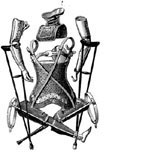
From a Witness in Bangkok to a Near Martyr in Karachi
THE LORD'S SUFFERING SERVANT
It happened on St. Patrick’s Day in a suburb of Karachi, a megalopolis in southern Pakistan. It was there, Michael’s wife told me, that Muslim thugs recognized him. They hailed his tuk tuk, or motorized rickshaw, pretending to be potential customers. When he approached, they declared, “We know who you are. We have been looking for you for many years.” They dragged him to the ground and began to beat him. They set fire to his tuk tuk, a source of income he had only recently purchased. By God’s grace, police arrived before the men could kill him. Michael was rushed to the emergency room, his bleeding body covered in bruises, his backside marked with deep cuts. As the Lenten season approached its climax, Michael had himself become a living, physical manifestation of the suffering servant of Isaiah 53.
NOR readers will be familiar with Michael’s story. I met him in 2014 in Bangkok, Thailand, not long after I moved there with my family. As I recounted in a previous NOR article (“A Witness in Bangkok,” Dec. 2016), Michael stood out among the sea of Pakistani Christian asylum-seekers and refugees. His devotional practices and piety were open and sincere — you might even say zealously defiant. He told me his story, one of persecution, false accusations of blasphemy, and threats of violence. Perhaps Muslim extremists in his native home of Karachi found his Catholic piety an affront. They robbed him at gunpoint and threatened to kill him and marry off his wife and teenage daughter to Muslim men. They posted pictures of him around the neighborhood, claiming he had insulted the Qur’an and Muhammad. In Pakistan that’s effectively a death sentence — it’s only a matter of time before an agitated Muslim mob comes for a supposed blasphemer’s blood. So Michael and his family went into hiding and eventually fled to Thailand with their entire life savings (a few hundred U.S. dollars), where they hoped to secure refugee status.
After more than five years of waiting in Thailand, the United Nations High Commissioner for Refugees (UNHCR) denied their refugee application, as well as their subsequent appeal. The family twice spent time in a corrupt, disease-ridden Thai detention center: for several weeks in 2015 and about eight months in 2016-2017. Yet Michael’s faith, and that of his family, never wavered. My wife and I visited them in jail frequently, bringing supplies, praying with them, and encouraging them to stay strong. Finally, in summer 2017, with their health deteriorating, Michael requested help paying for tickets back to Pakistan. A few gracious families helped get them on a flight back to Karachi, shortly before my family and I moved back to the U.S.
Back in Pakistan, it was difficult for Michael to find work. He and his wife had some family and a few friends they could rely on, and my wife, now back in the States, collected money to send to them in Karachi. Michael littered his Facebook page — and my Messenger phone app — with religious-themed content, sometimes in the middle of the night while I was trying to sleep! No one could question his religious devotion. Eventually, Michael secured enough money, somewhere around $2,000, to purchase a tuk tuk, and he became a taxi driver. His kids, meanwhile, were back in school after their education had been interrupted by their incarceration in Bangkok. Things seemed to be stabilizing. Then came the attack.
You May Also Enjoy
Should Catholics try to convert Muslims? This has been a thorny question since the promulgation of Nostra Aetate.
For every “religious war” there have been 13 others, which, according to the Encyclopedia of Wars, could have been avoided had there been more religion.
By rejecting the cultural particularism that informed the disposition of the Old Right, its prodigal descendent dooms itself to aimlessly meander the political landscape.

